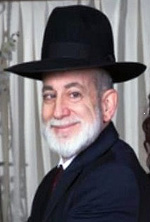Look at It! No! Look at Him!
By Rabbi Yaakov Marks

SAN DIEGO — Tzoraas is a misunderstood phenomenon. The Torah describes it as various discolorations that can happen to clothing, houses, or a person’s body. A trained Cohen examined the object or person and depending on the shade of the color, placement, and several other technicalities would either pronounce the blemish to be Tzoraas and impure or a form of a rash and it would be rendered harmless. If it was declared Tzoraas the piece of clothing and house would face partial or complete destruction and a person would be sent out of the civilized area to live in solitude until the Tzoraas clears up.
Many modern day scholars translate Tzoraas as leprosy. This is very misleading because Tzoraas is not in any way a medical malady and cannot be transmitted. It was spiritually generated for one of seven possible reasons: gossip, murder, misused oaths, immorality, arrogance, theft, and misery (Arichin 15a). The Tzoraas would first affect the offender’s house. If he was unrepentant it would get closer to him by attaching to his clothes. If still unmoved, the Tzoraas would settle on his body until he gave up his unethical behavior.
Several questions are asked about Tzoraas and its procedures. Aharon and the other Cohanim are called a holy nation and transmitters of peace, so why would they be forced to declare this person impure and disrupt his life. The Torah says the phrase “and you will see it,” and “you will see him.” Twice when it would have sufficed to say it once. There are no extra words in the Torah. If this person hasn’t responded to all the previous warnings, why make the Cohen talk to him, mandate a punishment for him? After everything that he has done, does he deserve the Cohen’s precious time?
G-d is teaching us a fantastic lesson about people and ourselves. The Cohen is the perfect person to deal with this hardened criminal. The Cohen isn’t prejudging the person standing in front of him. G-d tells him to look at the blemish, talk to the person, and try to help him understand what he is doing wrong. Maybe he doesn’t see the harm he is causing or life has made him callous. Then G-d says look again, but not at the blemish, but at the man. Is he just married, is a family occasion in the immediate future, or maybe a Holiday is about to be celebrated? The Cohen would then delay his declaration until an appropriate time. G-d said look at the blemish and then at the man without the blemish. Look at the good he has done. Look at the trials and tribulations he has gone through in life that brought him to this place. The Cohen the lover of peace will then lovingly talk with this person and without blaming, try to help the person to see his positive abilities and positive accomplishments. Many people give up because they focus too much on the bad they have caused and not the good they have brought. Just like the Tzoraas brings the bad from the inside to the surface, maybe the Cohen can bring the good from the inside to the surface. What could be a more befitting task for someone from a “Holy Nation” then to help someone overcome their obstacles and lead a life of peace and serenity.
We too must talk to ourselves the same way. Many of us focus on the things we do wrong or temptations we succumb to and give up. We label ourselves as failures. During a conversation we hurt someone’s feelings and we look at ourselves as a bad person, but if we would count how many people we made feel good that day we would see what a great friend we are. Someone with a health goal, who for several weeks was eating and exercising properly was attending a wedding. By the end of the night he had given in to most of his temptations. When he got home, he told his wife you see I can’t do it. I give up! He needs the Cohen inside of him to lovingly say, “yes, you had a bad night, but that doesn’t make you a bad person. You had many great weeks with one bad night. That makes you a great person who made one mistake.”
G-d is telling us that every normal person has good in them, but many people will give up because they focused too much on the mistakes or life problems and not on their positive actions and the good that life has brought them.
May G-d bless us that when we do make a mistake or life puts an obstacle in our path that we should have the strength to refocus on all the good and get back up and keep dancing. May we have the wisdom to be able to see the whole person and not be blinded by his mistake.
*
Rabbi Marks is a life and health coach, who may be contacted via ahealthyrabbi@gmail.com. Comments intended for publication in the space below must be accompanied by the letter-writer’s first and last name and his/her city and state of residence (city and country if outside the U.S.)